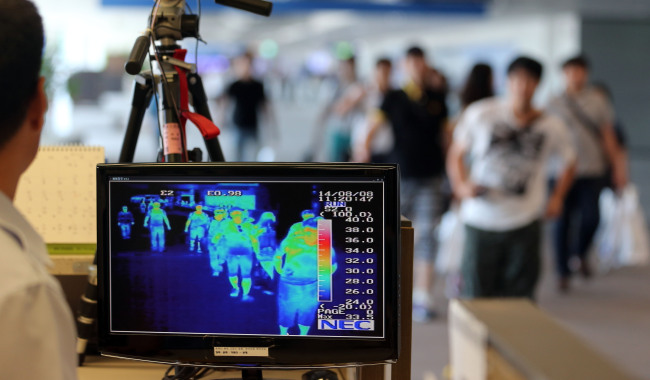Seoul considers importing Japanese trial drug for Ebola
By Claire LeePublished : Aug. 10, 2014 - 20:34
Seoul announced Sunday that it may import a Japanese antiviral drug for Ebola, which is still being tested on animals, as a preventive measure against the entry of the deadly disease to the country.
There is currently no vaccine or the U.S.-based FDA approved treatment for the Ebola infection, which has claimed nearly 1,000 lives in West Africa since March. The World Health Organization declared the Ebola outbreak an international public emergency on Friday.
Korea’s Ministry of Food and Drug Safety said the Japanese antiviral drug was likely to be the first treatment allowed by FDA to fight the deadly virus in humans. “We are thinking of importing the Japanese drug as soon as possible in order to prepare for a potential outbreak of the virus in South Korea,” the ministry said.
There is currently no vaccine or the U.S.-based FDA approved treatment for the Ebola infection, which has claimed nearly 1,000 lives in West Africa since March. The World Health Organization declared the Ebola outbreak an international public emergency on Friday.
Korea’s Ministry of Food and Drug Safety said the Japanese antiviral drug was likely to be the first treatment allowed by FDA to fight the deadly virus in humans. “We are thinking of importing the Japanese drug as soon as possible in order to prepare for a potential outbreak of the virus in South Korea,” the ministry said.

The antiviral drug, named favipiravir, was created by Toyama Chemical, which is a subsidiary of Fujifilm Holdings Corp. ― a Japanese maker of digital cameras and medical devices. The tablet, which was first developed as an influenza cure, was recently proven to be effective in preventing lab mice from dying of Ebola.
The Japanese drug is currently being tested on Ebola-infected monkeys, and the research findings will be announced next month, according to Korea’s food and drug agency.
Seoul issued a special travel warning for Ebola-hit Nigeria on Friday, following its earlier warnings for Liberia, Sierra Leone and Guinea, as a preventive movement against the disease’s entry to South Korea.
Quarantine inspections of all arriving passengers from the four African countries are also being enhanced, the Health Ministry said.
A total of 13 quarantine stations nationwide are “on alert” for potential Ebola victims, while the Foreign Ministry is monitoring Korean nationals residing in Ebola-hit countries in Africa.
The Ebola infection has a fatality rate of up to 90 percent. Its early symptoms ― fever, sore throat and muscle aches ― are similar to those of other illnesses, such as malaria and the flu. Patients in later stages, however, may experience severe internal bleeding as well as blood secreting from their eyes or ears.
The virus is only spread by direct contact with bodily fluids of infected patients, such as blood, sweat, saliva or semen. It cannot be caught by breathing the same air, the health authorities said. The chance of the virus being brought into Korea is very low, they added.
While no Ebola cases have been reported in South Korea, a representative body of some 100,000 local physicians suggested last week that all arriving passengers from the Ebola-hit countries must be monitored for at least three weeks upon their entry to Korea.
By Claire Lee (dyc@heraldcorp.com)


![[Herald Interview] 'Amid aging population, Korea to invite more young professionals from overseas'](http://res.heraldm.com/phpwas/restmb_idxmake.php?idx=644&simg=/content/image/2024/04/24/20240424050844_0.jpg&u=20240424200058)















